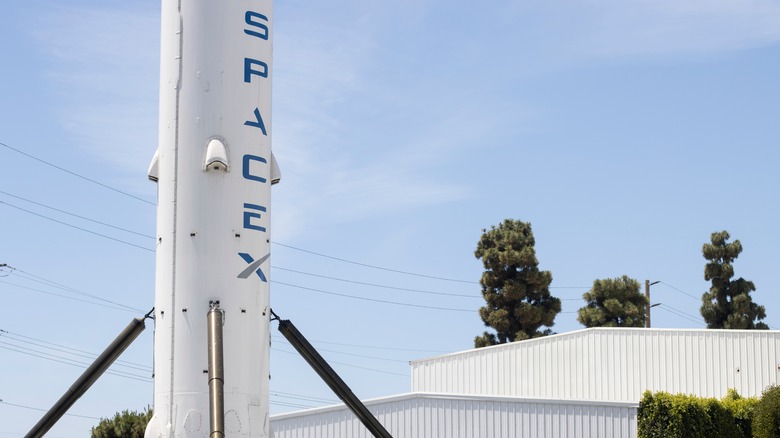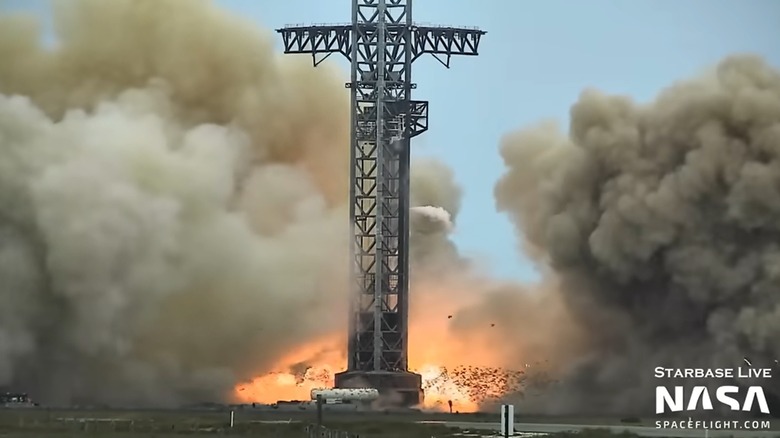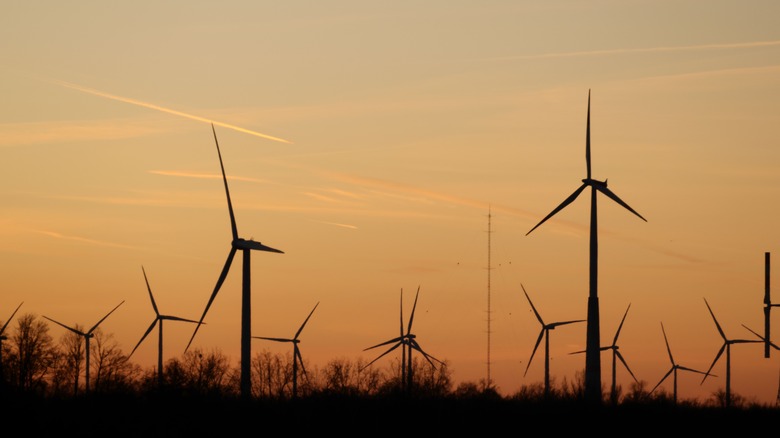Why SpaceX Is Under Fire After The Record Breaking Super Heavy Booster Test
SpaceX tested the Super Heavy rocket booster on February 9, 2023. The static firing of the rocket marked what is likely to be the most powerful booster ignition in the history of human space exploration. The rocket includes 33 engines, and 31 were successfully lit and fired throughout the testing. Elon Musk noted in a tweet that this was "still enough engines to reach orbit!" The Super Heavy booster is a massive launch platform designed in concert with the Starship project. This system is designed to bring people and equipment far into the depths of space. The goal is to support missions to Mars, life in orbit, and exploration far beyond our current reach.
This test fire is a big step in the right direction for SpaceX's plans. As of this exercise, the company is still awaiting licensing from the FAA for an orbital test flight. Therefore, the booster test was conducted without the spacecraft attached, and the boosters were tethered to the launching apparatus. This test signals that SpaceX may be ready to progress into the next development phase, and a full-scale launch could be looming just over the horizon.
The booster test highlighted an alarming problem, however
While the Super Heavy booster test appears to have gone well, there's another critical issue that it has illuminated. SpaceX will likely have to deal with the FAA on environmental impact issues again after clearly failing to consider the concerns they had previously highlighted. Video of the booster test showed a fiery ignition that's likely to impress any rocket enthusiast.
However, the video also captured something disturbing. As the rockets ignite, a massive plume of birds can be seen taking off around the launch pad. The flock circles the towering engine complex. However, a large volume of the initial scramble is seen to be evacuating the area only to be consumed by the fire and smoke billowing out the bottom of the pad. Many birds can be seen falling back down to the ground.
This alarming revelation shouldn't come as a surprise, unfortunately. In 2021 The Guardian reported that the climate impact in the Boca Chica segment of the Lower Rio Grande Valley National Wildlife Refuge was likely to be severely and negatively impacted by the company's presence and expansion plans. CNBC reported similar findings regarding endangered species living in the area in 2022. If SpaceX is to take any serious steps forward with its rocket launch technology, a monumental effort will have to be placed into either protecting the surrounding landscape or moving the facility to another location.
Technology has a way of interfering with local habitats
On a grand scale, technological advancements bring vast improvements to the lives of everyday people. All across the world, cell phones and connectivity technologies have made communication virtually instantaneous and brought about a dramatic shift in how we live at a fundamental level. However, companies must source vast reserves of precious metals found within the Earth (including palladium, platinum, and even gold and silver) to build a cell phone, laptop computer, or tablet. Many mines that extract these metals are located in the most oppressive places on the planet, and workers are often underpaid and mistreated. Moreover, the extraction of precious metals strips the landscape of its once-thriving habitat for local plant and animal species. This process forever terraforms the Earth in a stark reversal of the depictions valorized on distant planets in the mind's eye of science fiction.
Even renewables – humanity's answer to this abusive resource extraction that scars the Earth and its people – aren't blameless in the negative transformation of habitats. While it's estimated that more than 25 million birds are killed each year in collisions with power lines, the number of deaths due to contact with a wind turbine blade sits at roughly half a million.
The recent SpaceX test showcases how important it is to consider the environmental impact of our actions, even — and especially — if the purpose is something that may benefit humanity in many ways.


